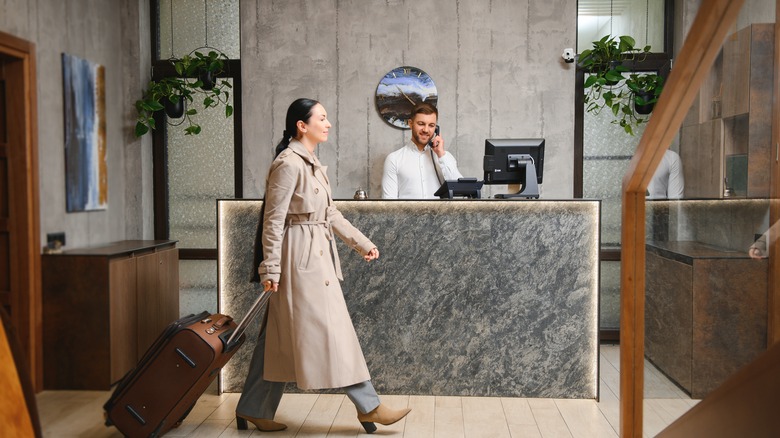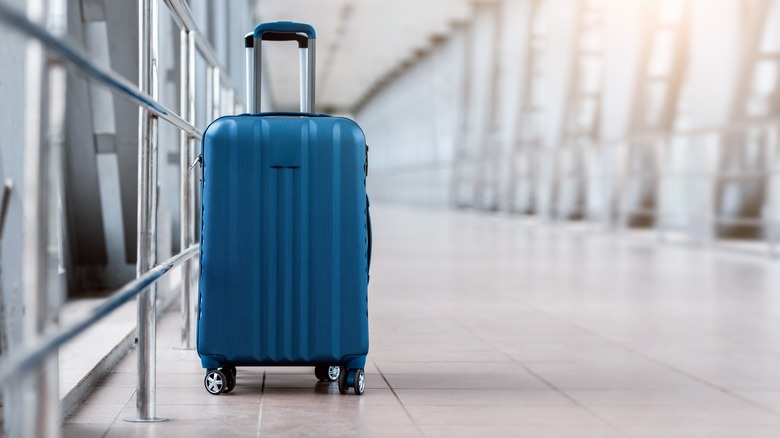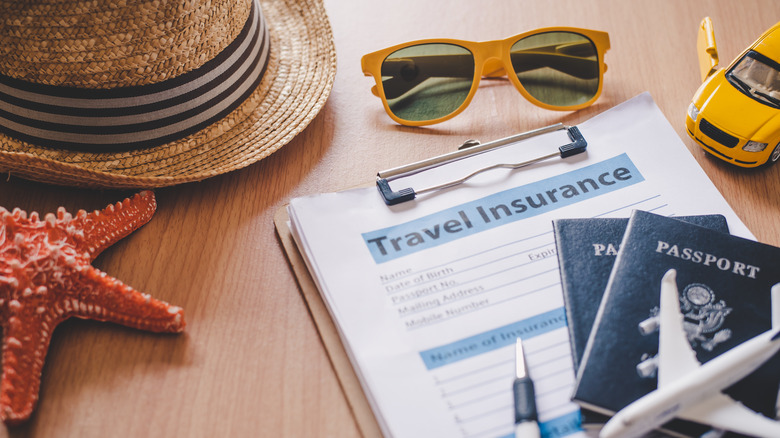Stop Making These Unnecessary Travel Purchases On Vacation To Save More Money
As much as a relaxing, or even culturally immersive, vacation might sound like the perfect getaway, the amount of money required to make such a trip happen could prove prohibitive for many Americans. As inflation continues to affect everything from essential household items to dollar store purchases, would-be travelers are sure to see a similarly high jump in the price of their vacations. From airfare to rental cars to accommodations, planning a trip can include a lot of different elements — elements that each come with their own inflationary increases. According to NerdWallet's Travel Inflation Report for July 2025, overall travel costs are up 9% when compared to pre-pandemic prices, with certain categories like rental cars and food away from home experiencing far more extreme price hikes.
According to a report from Motley Fool, the average cost of a vacation in 2025 is projected to be $7,249, which is up almost $1,400 when compared to 2024 and up over $3,600 when compared to 2022. Even worse, would-be international travelers can expect to pay an average of $9,922 for their vacation, which is over $4,000 more than in 2022. With all of this in mind, there are certain specific purchases — ones that many travelers tend to make — that are almost guaranteed to cost you extra and leave you over budget. From luggage fees and travel insurance to overpriced hotels, packing errors, and even restaurant faux pas, travelers can face a multitude of different scenarios both before and during their trip that can lead to unnecessary purchases.
Large suitcases
While generally a requirement whenever travelling, luggage can unfortunately come with its fair share of baggage. For starters, deciding whether to check or carry-on your luggage can come with a multitude of associated costs. Depending on your airlines, you might have to pay extra to check your bag — even once-heralded airlines like Southwest have decided to start charging customers for checked bags so chances are good that this option will cost you. Unfortunately, these added bag fees can quickly add financial bloat to your once-affordable airline deal.
On the flip side, those deciding to carry on their bags can similarly face added costs. For starters, each airline has its own dimension requirements for carry-on bags, which could leave you having to purchase a new piece of luggage altogether in order to fit your particular airlines' specifications. With that said, checked luggage also faces size limitations depending on the airline, with oversized pieces coming with added fees that can easily exceed $150 per item.
It's also worth noting that, whether you check or carry-on your bag, you might still end up facing weight restrictions. For those who might hope to come home with mementos, these weight restrictions can end up costing you at the airport. On Southwest, a checked bag weighing between 51 and 70 pounds costs an additional $100, on top of the checked bag fee, while a bag weighing between 71 and 100 pounds is an additional $200. Meanwhile, on American Airlines, overweight bag fees range from $100 to $450 per bag, depending on the destination. In the end, avoid checking your bag, and remember to pack light.
Travel insurance
While there is much debate over whether travel insurance is worth it or not, it's worth saying that certain kinds of travel insurance products are definitely not worth the money. Case in point, you should probably avoid baggage insurance, which often comes with limited coverage for a problem that rarely occurs. With that said, data from Squaremouth found that travelers that filed a travel insurance claim in 2022 saved an average of $1,891. Plus, the report found that, while travelers paid an average of $266 per policy, when a claim was required they received an average reimbursement of $2,157. With that said, travel insurance can certainly be a smart purchase in the event that you end up needing it. However, it's important for travelers to avoid unnecessary add-on coverages at check-out, like the previously mentioned baggage insurance.
The main thing to consider when deciding on travel insurance is whether your reservations are non-refundable or not. For instance, if your flight or hotel has a penalty-free cancellation policy, then travel insurance might not be worth the added cost since a last-minute cancellation wouldn't actually financially hurt you. Similarly, if you booked cheap airfare and accommodations for a budget trip, the cost of the travel insurance can cost more than the coverage would actually be worth. Another thing to consider is that, depending on your specific provider and card, you might already have included travel insurance coverage as part of your card provider's offerings. With that said, make sure to review the coverage levels carefully before departing.
Food or drink packages
Food can, and does, make up a large part of any traveler's expenses. While the temptation to try everything in a foreign country can be strong, not understanding the dining culture, or prices, of the places you visit can ultimately cost you. From understanding the hand gestures that might leave you with an unintended double order to knowing how to order tap water to avoid added beverage costs, there are numerous ways to cut unnecessary purchases when it comes to your dining experiences while traveling. For starters, understanding the tipping culture in, say, Europe for not just restaurants but also when it comes to transportation like taxis and ride-share apps can save you a considerable amount of money while also ensuring you are respectful of local traditions.
For those who might be departing on a cruise or enjoying a pre-packaged resort style trip, ensuring you have a solid understanding of any included dining and/or drink packages in your reservation can be the key to ensuring you stay within your budget. At the same time, it can be worth considering what these kinds of packages actually entail before making your bookings in the first place. Drink packages, in particular, can often require many more rounds of beverages to break even than you might think. According to Tour Plan International, drink packages on cruises can cost between $85 and $100 per person, per day. For those who are light drinkers, or even those who avoid alcohol altogether, it might not be worth paying for an add-on package like this.
Onsite clothing and gear purchases
While the previously mentioned luggage fees can certainly put a damper on your travel budget, there are still certain things you should absolutely make sure to pack when travelling. Toiletries, in particular, should earn a designated spot in your luggage. For those traveling abroad, you might find that you end up wasting precious vacation time, not to mention unnecessary money, trying to find replacements for your everyday bathroom items. From language barriers to potential geographic barriers to certain products, leaving behind your preferred toiletries can be a lot more hassle than its worth. For example, as of 2020, painkillers like aspirin, paracetamol, and ibuprofen are no longer available on pharmacy shelves in France, instead requiring a consultation with a pharmacist in order to obtain. This could lead to unnecessary — and subsequently untreated — headaches for visiting non-French speakers. For those traveling to more contained locations like, say, Disney World, the markup on toiletry items in these kinds of branded facilities could similarly damage your budget.
Another consideration when packing is the weather. Not packing properly for heavy rain, or failing to pack a swimsuit during sunny weather, can similarly lead to unnecessary purchases during the course of your vacation. Plus, this can require unplanned shopping trips that might take away from sightseeing time. Worst of all, for those that might already own a rain jacket or rain boots, these purchases can lead to unnecessary duplicates once you get back home — not to mention how much these bulky items might further impact your luggage fees during the return trip.
Overpriced accommodations
As appealing as it can be to stay in a five-star luxury hotel, depending on your destination, and the things you are hoping to do while on vacation, you might not be spending all that much time in your hotel room. This can lead to an undue portion of your vacation budget going to accommodations that you don't actually use that much. This can be especially true for large resorts that might include tacked on pricey mandatory resort fees while simultaneously baking in "complimentary" offerings -– such as low quality breakfasts, which many guests ultimately fail to take advantage of –- into their nightly room rates. According to research from CoStar, more hotels around the world than ever before reported an average daily rate (ADR) of over $1,000 in 2024. Unsurprisingly, since 2019, five of the 10 countries that grew their ADR rates to over $1,000 the fastest were in Europe, although the country with the largest growth in hotels boasting ADRs over $1,000 was the U.S.
While a good night's sleep is certainly important while on vacation, many travelers over prioritize luxury features when it comes to their accommodations. Instead, visitors might consider more non-traditional accommodations like bed and breakfasts in Europe, or even an overnight stay in a monastery to both save money, and have a more unique experience on their trip. Rather than a focus on luxury amenities, visitors should seek out hotels in key locations – either for walkability to city centers, proximity to public transportation, or easy access to your selected airport.





